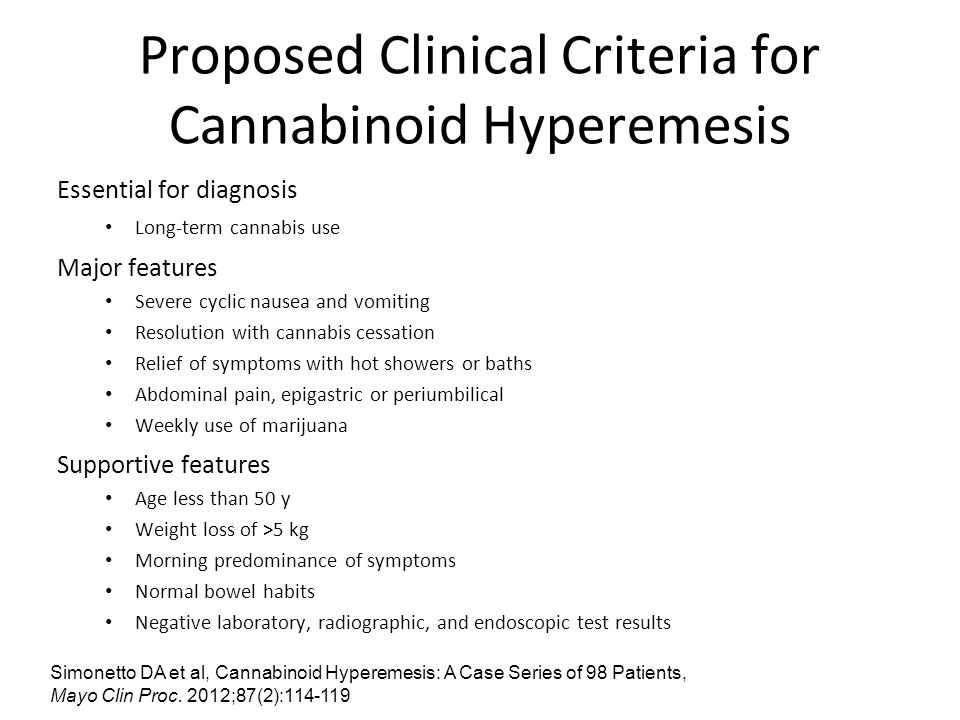Cannabinoid hyperemesis syndrome, a new illness only recently acknowledged by the medical community has been seen more commonly since new states have been legalizing medical and recreational marijuana.

It affects a small population — mostly, a subset of marijuana users who smoke multiple times a day for months, years or even decades.
Cannabinoid Hyperemesis Syndrome is characterized by cyclic episodes of nausea and vomiting and frequent hot bathing. 
Chalfonte LeNee Queen suffered periodic episodes of violent retching and abdominal pain that would knock her off her feet for days, sometimes leaving her writhing on the floor in pain.
“I’ve screamed out for death,” says Queen, 48, who lives in San Diego. “I’ve cried out for my mom, who’s been dead for 20 years, mentally not realizing she can’t come to me.”
Diagnosing Cannabinoid Hyperemesis Syndrome can be frustrating and expensive.
There is no blood test to link the stomach ailment with marijuana use, so physicians often order pricey CT scans and lab tests to rule out other medical problems.
One way doctors have been diagnosing the illness is when a patient says that hot baths subside the symptoms. For whatever reason, unknown, patients who develop this disease find a significant relief in hot showers and baths. Toxicologists say the heat may distract the brain from pain receptors in the abdomen but, like Cannabinoid hyperemesis syndrome itself, is still very misunderstood.

The exact cause and onset of Cannabinoid hyperemesis syndrome remain much of a mystery today in the medical field. The first diagnosis of this illness can be dated back to 2004 by an Australian doctor. Since Cannabinoid hyperemesis syndrome is a newly recognized illness, only been seen more commonly throughout the US due to the recent passings of Marijuana laws, it is often mistaken for something else.
Toxicologists say the chemical compounds in marijuana may throw off the normal function of the body’s cannabinoid receptors, which help regulate the nervous system. Some people may be genetically predisposed to the syndrome, or marijuana’s potency or chemical makeup may have changed over time, says Dr. Craig Smollin, medical director of the San Francisco division of the California Poison Control System and an ER doctor at Zuckerberg San Francisco General Hospital.

Since most people, especially cancer patients are told that marijuana is known to aid in nausea and vomiting, it seems hard for a patient to believe that the link to their aggressive and chronic vomiting spells is due to marijuana. 19-year-old student Cameron Nicole Beard, of East Moline, Ill., said she struggled to believe her doctors about the link between pot and severe vomiting.
“Who wants to be told you can’t smoke marijuana when you think marijuana can help?” says Beard, while recovering from a marijuana-related vomiting episode at a University of Iowa hospital in Iowa City, Iowa, last month. She said she had lost 20 pounds in 10 days.
There is still no direct cure for Cannabinoid hyperemesis syndrome, although doctors are getting better at treating the symptoms. They have been using old anti-psychotic medications and cream for muscle aches.
For questions on detecting marijuana use, please visit Accredited Drug Testing, or call 1-800-221-4291.

